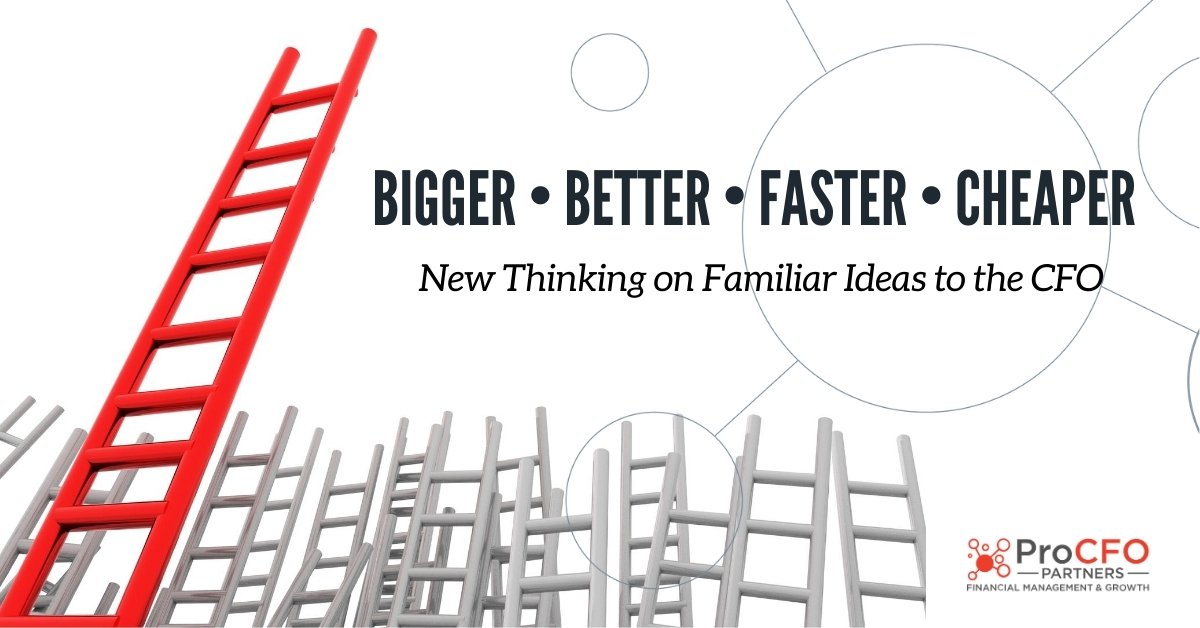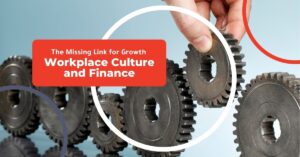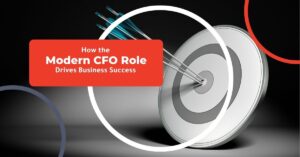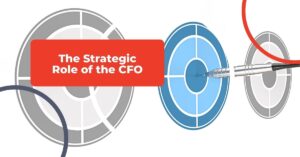Bigger, Better, Faster, Cheaper: New Thinking on Familiar Ideas to the CFO
Aug 3, 2020
Bigger, Better, Faster, Cheaper.
As the role of the CFO has evolved, the impact the CFO has on an organization has evolved too. But the results the CFO should be delivering are as familiar as ever – helping the organization grow bigger. Do things better. Get there faster. And ultimately, save (or make) more money doing it. It’s how these things happen that are more interesting and important than ever.
The Meat and Potatoes of Financial Functions
The framework of a business is largely built around traditional values like financial systems and reporting. Goals and strategies, revenue models, measurement systems – these are all essentials for an organization’s financial health. Imagine this as the content of what a CFO does.
As business has changed, the CFO’s opportunity for impact and influence has grown from being an operator or steward of the assets of a corporation to being a catalyst and strategist for growth and momentum. In essence, creating context around the traditional values of the CFO. For instance, a revenue report might show numbers that appear healthy, and so the result is to keep doing what’s working. Today’s CFO can look at the context of the revenue report and say, “you know, the cost of delivering to these lower 50 clients is actually more than the value we get out of it. We could be making more money if we changed those relationships.” In the past, just delivering the information was enough. Today, business leaders must understand the information and what to do with it.
Future-Proofing An Organization
When we start thinking contextually about an organization’s financial function, new questions lead to new answers. For example, a company was using a scorecard methodology to look at the revenues and profits of the past first and second quarters, and were asking how to make these scorecards more meaningful. We suggested looking closely at cash flow, particularly because in the time of this conversation, larger financial institutions are restricting credit. Then we asked, what about third quarter? What about the fourth? What about next year? Looking at past reports is useful but incomplete. We encouraged asking more questions about what needs to change in the business to hit targets in the future, which is a departure from what many companies do when creating goals and targets – looking at the past and tacking on some percentage with the assumption that business as usual will continue.
The Changing CEO Relationship
It’s not just the CFO who’s role and impact has evolved – all aspects of leading a company has changed, including the CEO’s. There was a time when CEO’s wanted as much information as they could manage and then wanted to be involved in pushing the buttons and pulling the levers in response to that information. As time went on CEO’s still wanted information but did a better job delegating the responsive actions to others – the old maxim of working on the business vs working in the business. Today and tomorrow’s CEO’s don’t even want all the information – just a dashboard of high-level, high-value data to help steer the vision of the company. They want to notice trends and have others provide direction and guidance as a result. As trends emerge, the CFO can figure out the cause and what to do about it while the CEO stays focused on where the company is headed.
The Trust Required for Transformation
This requires deep trust among all business leaders, but especially with the CFO. The modern CFO can’t just report the numbers and expect others to figure out what they mean and what to do with them – they need to offer insight and even revelation on the deeper story the numbers are indicating. With that comes guidance and recommendation on what to do with those insights. The CEO needs total confidence not only that the reporting is accurate, but that the guidance coming from the CFO as a result is well informed from other financial functions, fits in relationship to other key aspects of the organization, and is ultimately steering the company towards the CEO’s vision.
Bigger, Better, Faster, Cheaper.
An organization led with sound financial guidance doesn’t just grow bigger, it thinks bigger. It doesn’t just “get better,” it defines things better, so it can focus on what to do better. A great CFO doesn’t necessarily speed up operations, but they can help identify goals and strategies more quickly, understand gaps, and identify inefficiencies that, if better managed, speeds things up. And your CFO can help you save or make more money by seeing all aspects of how your financial functions operate in relationship – in context. Same as it ever was, your CFO is dedicated to Bigger, Better, Faster, Cheaper. What’s changing more quickly than ever is how each organization identifies with those concepts, and having the right financial leadership to drive change as a result.


